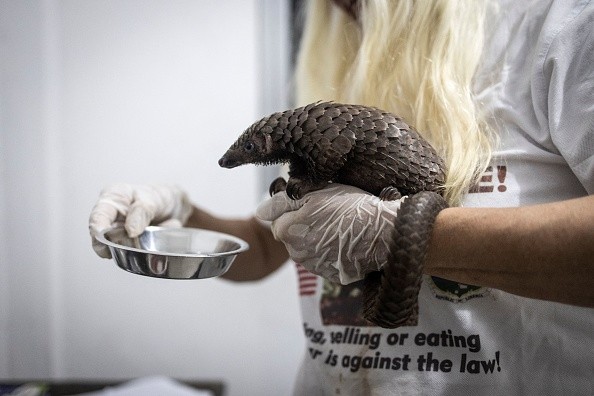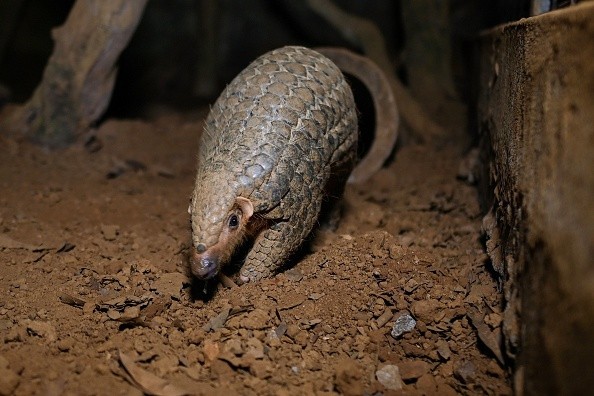The most trafficked animal in the world, pangolins, are cared for by a wildlife sanctuary. Juty Deh Jr. is giving a young pangolin which was abandoned milk in a bottle at the Libassa Wildlife Sanctuary in Liberia, West Africa. The most trafficked animal in the world is said to be these tiny, scaly critters.

Saving Pangolins
All eight pangolin species in Africa and Asia are in danger of going extinct because they are slaughtered for their flesh and used in traditional medicine. Due to their highly specific diet of ants and termites, they are known as "ants bears" in Liberia, and this sanctuary is a shelter for them.
According to Deh Jr., "Since I started working with Libassa Wildlife Sanctuary, I feel like an animal(s) are part of me." Because of this, I feel hurt anytime I witness someone harming an animal.
The majority of the pangolins brought here by the Liberian Forestry Development Authority were confiscated, surrendered, or orphaned due to the bushmeat trade. Deh Jr. joined the sanctuary when it opened five years ago and claimed that he had cared for over 70 pangolins.
At-Risk Creatures

With more than two-thirds of its area covered in forest, Liberia is the West African nation with the most forests. These forests, abundant in fauna and flora, are a part of the "Guinean Forests of West Africa" biodiversity hotspot, which, according to a 2018 USAID report, is home to 30 species of primates and three of the eight pangolin species found in the world. It also contains a quarter of all mammal species found on the continent.
In addition, many individuals reside in wooded regions. In Liberia, eating bushmeat-which includes anything from primates to the cat-like civet-is a long tradition, and pangolin is regarded as a delicacy. Deh Jr. grew up eating the animal, something he now regrets. As a young child, you have little option but to live with your parents because you cannot fend for yourself. Therefore, even if you don't want to eat bushmeat, you must.
But a new danger has now materialized for the neighborhood pangolins. According to Susan Wiper, director of Libassa Wildlife Sanctuary, the animal is being killed to meet demand from China and Vietnam, where its scales are utilized in traditional medicine.
According to a 2020 report from the UN Office of Drugs and Crime, the number of pangolin exports captured internationally grew tenfold between 2014 and 2018. Most seizures occurred in Asia, and the animals were mainly from Africa. The research noted that the main suppliers of pangolins were Togo and Uganda and that Liberia had lately been linked to significant seizures in Ivory Coast. Before 2009, Asia was the primary supplier of pangolin scales, and the research highlighted that the increase in African imports might be related to a drop in Asian populations.
Although Wiper notes that precise numbers are difficult to get, the WWF believes that over a million pangolins have been stolen internationally in the last ten years. She continues, "Nobody knows the numbers in Liberia, so every pangolin gone is really a calamity.
With one exception, their scaly defenses shield them from virtually all predators. Deh Jr. claims that pangolins have no other natural enemies outside people. "If they become scared, they roll into a ball, and no other animal can move through the scales. But (that) also make it simple for us to pick it up and do whatever we want to do with it," he adds.
Legislative Protection
International treaties have outlawed the commercial traffic in these creatures, and in 2016 the Liberian government passed legislation making it unlawful to hunt, purchase, sell, catch, transport, or consume any protected species, including pangolins. Enforcing this law, however, is still difficult. According to Wiper, the future of conservation in Liberia depends heavily on education and awareness because many people aren't aware that it exists.
She yet holds onto the belief that things are altering. She claims that the Liberian Forestry Development Authority is becoming more involved in seizing illegally stolen protected species from the wild.
Sanctuary So Far
According to Wiper, the refuge has taken in almost 600 creatures over the previous four years, including pangolins, miniature crocodiles, monkeys, and others. The major goal, according to her, is to save and restore as much Liberian wildlife as possible to the forest.
There aren't many prizes higher than this for Deh Jr. "Reintroducing it back into the wild makes you feel proud," he claims. "You save small animals, so you feel like you're making progress."
For more animal news, don't forget to follow Nature World News!
Related Article : Wildlife Trafficking Plummeted Amidst the Pandemic, Giving Perfect Opportunity for Long-Term Solutions
Related Article: Wildlife Trafficking Plummeted Amidst the Pandemic, Giving Perfect Opportunity for Long-Term Solutions
For more animal news, don't forget to follow Nature World News!
© 2026 NatureWorldNews.com All rights reserved. Do not reproduce without permission.





